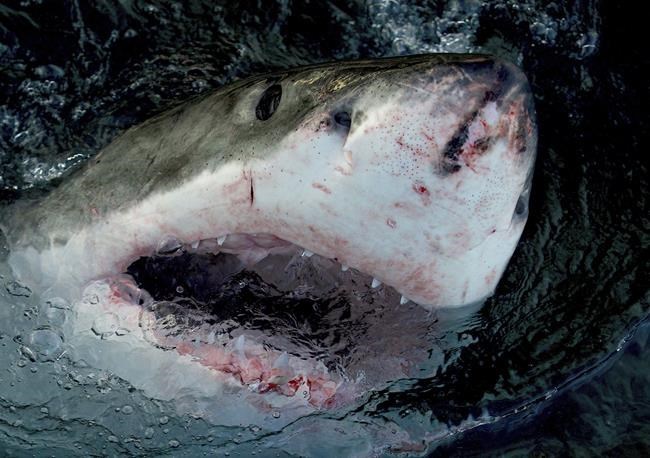FREDERICTON — The discovery of two dead great white sharks washed ashore in Atlantic Canada in less than two weeks is a mystery to researchers.
Fred Whoriskey, executive director of the Ocean Tracking Network at Dalhousie University, called the beaching of two of the ocean's apex predators abnormal.
"In the course of my lifetime — and that's a lot of years — there have been fewer than five white sharks that I have heard of beaching anywhere in the North American area," he said in an interview. "So, this is a highly unusual event."
The Marine Animal Response Society said in an Oct. 21 social media post that a great white shark had been found dead in Kouchibouguac National Park in New Brunswick the previous weekend. The organization studies marine animals and helps with rescues and investigations.
The 3.4-metre mature male was found on the beach and samples were collected to help in the study of the species.
Whoriskey, who is not involved in the necropsy of the animals, said a second great white found dead Wednesday in North Sydney, N.S., was a juvenile.
The great white shark is endangered under the federal Species at Risk Act. There are no estimates of the size of the population in Atlantic waters, according to the federal Environment Department's website. There are around 100 records of white sharks being spotted off the Atlantic coast since 1874, although sightings are increasing, with more than 40 since 2009, the website added.
The deaths of two sharks within such a short span could be a sign that the number of these animals is increasing, Whoriskey said. Most of the sharks seen in Canadian waters tend to be juveniles, which is one of the indicators of a growing population.
"It might very well be that we would expect to see more frequently things like natural mortalities, because, like it or not, things go wrong in biology."
Whoriskey said white sharks do not have any predators in Atlantic Canadian waters. "So, we're probably looking at natural causes for both of these animals. Which is kind of an interesting phenomenon."
Pictures of the sharks, he said, don't suggest that they were killed by a ship strike or rope entanglement. The animals could have died from a virus or bacteria, which could be investigated in the necropsy process, he said. But that isn't straightforward because scientists don't have a good idea of the types of diseases white sharks get.
"If we don't know what we're looking for, we don't have a probe to pick it up yet. It may be a disease organism that hasn't been identified yet by science. So that could be kind of intriguing," Whoriskey said.
Boris Worm, a professor in marine conservation biology at Dalhousie University, said great whites are found all the way up to Newfoundland. They are usually in Canadian waters in late summer and fall, he said, "probably chasing some prey species into our region, like mackerel."
The greatest risk to the species, Worm said, is humans.
With fishing trawlers, a shark on a hunt might not notice the trawl net and get caught, which could lead to its death, he said.
And longline fisheries put out baited lines with hundreds of hooks. Sharks with their remarkable olfactory senses can smell this from a distance and are attracted to it, he said.
"These fisheries typically have a large bycatch of sharks," he said. "They would not often bring aboard white sharks because the white sharks would bite through the line if they get caught and escape. But they have occasionally been reported in longline fisheries."
This report by The Canadian Press was first published Oct. 28, 2022.
Hina Alam, The Canadian Press



